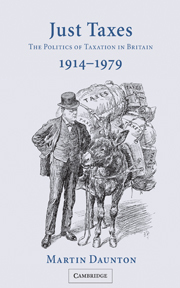Book contents
- Frontmatter
- Contents
- List of figures
- List of tables
- Preface
- List of abbreviations
- 1 The taxing state: an introduction
- 2 ‘The limits of our taxable capacity’: war finance, 1914–1918
- 3 ‘This hideous war memorial’: debt and taxation, 1918–1925
- 4 ‘Adjusting the particular turns of the different screws’: reforming the income tax, 1920–1929
- 5 ‘The great conflict of modern politics’: redistribution, depression and appeasement, 1929–1939
- 6 ‘The exigency of war’: taxation and the Second World War, 1939–1945
- 7 ‘The mortal blows of taxation’: Labour and reconstruction, 1945–1951
- 8 ‘A most injurious disincentive in our economic system’: Conservatives and taxation, 1951–1964
- 9 ‘Modern and dynamic economic policy’: Labour and taxation, 1951–1970
- 10 Rethinking taxation policy: from an opportunity state to an enterprise society, 1964–1979
- 11 ‘Highly defensible ramparts’: the politics of local taxation
- 12 Conclusion
- Appendix: chancellors of the Exchequer and prime ministers, 1908–1983
- Bibliography
- Index
11 - ‘Highly defensible ramparts’: the politics of local taxation
Published online by Cambridge University Press: 23 December 2009
- Frontmatter
- Contents
- List of figures
- List of tables
- Preface
- List of abbreviations
- 1 The taxing state: an introduction
- 2 ‘The limits of our taxable capacity’: war finance, 1914–1918
- 3 ‘This hideous war memorial’: debt and taxation, 1918–1925
- 4 ‘Adjusting the particular turns of the different screws’: reforming the income tax, 1920–1929
- 5 ‘The great conflict of modern politics’: redistribution, depression and appeasement, 1929–1939
- 6 ‘The exigency of war’: taxation and the Second World War, 1939–1945
- 7 ‘The mortal blows of taxation’: Labour and reconstruction, 1945–1951
- 8 ‘A most injurious disincentive in our economic system’: Conservatives and taxation, 1951–1964
- 9 ‘Modern and dynamic economic policy’: Labour and taxation, 1951–1970
- 10 Rethinking taxation policy: from an opportunity state to an enterprise society, 1964–1979
- 11 ‘Highly defensible ramparts’: the politics of local taxation
- 12 Conclusion
- Appendix: chancellors of the Exchequer and prime ministers, 1908–1983
- Bibliography
- Index
Summary
By the turn of the nineteenth and twentieth centuries, the increasing cost of local government was placing immense strain on the local tax base which relied almost entirely on a rate on property – on housing, shops, factories, railways. This narrow tax base was causing serious political problems, for lower-middle-class house owners and shopkeepers were aggrieved that their profits were eroded by the costs of local government, and that other forms of income were not paying an adequate contribution. Further, the incidence of rates was regressive, for poor families spent a higher proportion of their income on housing. Reform of the local tax base proved highly contentious, not least because the Liberal government turned to the taxation of land values – an ideological assault on the unearned income of landowners that was productive of political controversy rather than revenue.
Rates continued to provide the basis of local taxation, which left two other solutions. One approach was to pass the cost of welfare from the local poor law to the central state, through old age pensions or insurance schemes: the successful reform of central taxation contributed to a change in the balance between the central and local state. Another was for the central government to offer grants-in-aid to local government, either as fixed sums or in proportion to spending. The danger of proportionate or percentage grants was that local authorities might subvert control over the national budget – and the Treasury's concern that money might be spent irresponsibly was exacerbated by Labour's capture of Boards of Guardians and local authorities.
- Type
- Chapter
- Information
- Just TaxesThe Politics of Taxation in Britain, 1914–1979, pp. 339 - 359Publisher: Cambridge University PressPrint publication year: 2002



